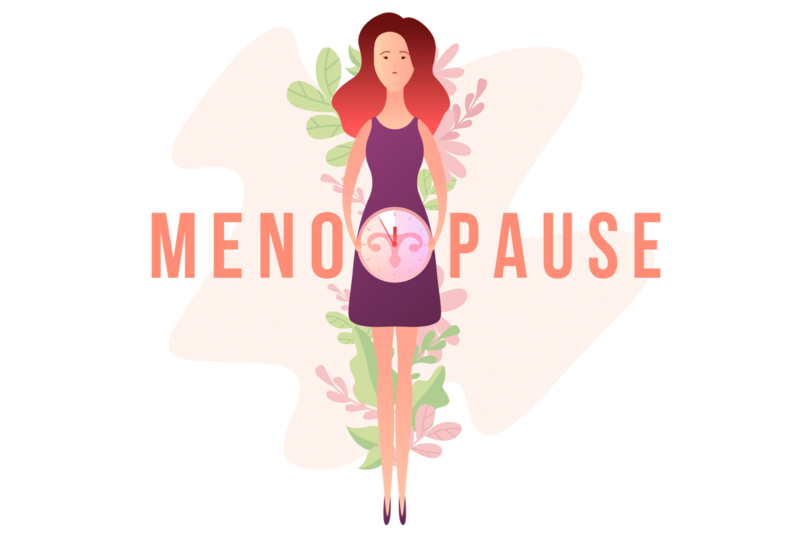
What’s menopause?
Menopause is a natural stage of a woman’s life; it is when ovulation and menstruation stop and fertility ends. Technically, menopause is when a woman hasn’t had a period for 12 months. Peri-menopause refers to the years before menopause when the menstrual cycle can be irregular. Menopause occurs naturally at around 51 years of age but can occur earlier or later. Some medical treatments such as chemotherapy and radiotherapy can cause early menopause. For instance, more than 60% of breast cancer survivors develop menopausal symptoms.
What are the symptoms of menopause and perimenopause?
Menopausal symptoms can occur during perimenopause and menopause. These symptoms are due to low estrogen and hormonal activity. 84.2% of women between 40 and 60 have some symptoms of menopause.
Menopausal symptoms include:
- Hot flushes;
- Night Sweats;
- Palpitations;
- Feeling the cold:
- Fatigue;
- Weight changes;
- Lower sex drive;
- Mood swings;
- Anxiety;
- Depression;
- Difficulty thinking clearly;
- Sleeping problems;
- Dry skin;
- Fluid retention; and
- Loss of bone density.
Western medical treatments of menopause
The most common treatment for the symptoms of menopause is hormone therapy (HT). However, HT is associated with increased risk of breast cancer and blood clots. See this link for more information about HT and its risks and benefits – https://jamanetwork.com/journals/jama/fullarticle/195120.
Because of these risks, some women who have a history of blood clots, stroke or certain cancers may be advised by their doctors not to take HT.
For these reasons, many women are seeking alternative treatments and acupuncture is increasingly popular to reduce menopausal symptoms.

How does Chinese Medicine view menopause and menopausal symptoms?
In Chinese Medicine, menopause is seen as a natural part of ageing. The life of a woman is divided into cycles of seven years, and the end of the seventh cycle is when fertility ends.
In Chinese Medicine, a woman’s reproductive system is controlled by three organs, the uterus, kidney, and heart. The Kidney is seen to be the most important organ and governs the hormones which regulate the menstrual cycle. Kidney Yin relates to the hormones which trigger the growth of an ovum each month, whilst Kidney Yang is related to the release of progesterone and ovulation. When a women enters peri-menopause the kidney gradually becomes deficient. This can then lead to disharmony between Kidney Yin and Kidney Yang.
If Kidney Yin is deficient, menopausal symptoms would include a dry mouth, dry eyes, hot flushes and night sweats. This is because there is not enough moisture to hydrate the body. Insufficient Kidney Yin can also lead to symptoms such as headache, dizziness, tinnitus, irritability and hypertension. Because there is not enough cooling Yin, heat can develop and cause anxiety, insomnia and heart palpitations.
If Kidney Yang is deficient, there is not enough vital energy. In this case, symptoms include, fatigue, foggy thinking, poor digestion, cold intolerance, fluid retention, weight gain and depression.
CM approaches treatment for menopausal symptoms differently than western medicine. Rather than trying to replace the estrogen, CM attempts to drop the estrogen levels faster, relieving the symptoms and making the menopause process smoother. Chinese Medicine treats the symptoms of menopause by restoring the balance between Yin and Yang, balancing affected organs, and strengthening Qi .
How can Acupuncture help during menopause?
There is growing scientific evidence that acupuncture can reduce the severity of the symptoms of menopause (Bevis, 2018; Avis et al., 2016: Ming et al. 2019). For example, Avis et al (2016) found that Acupuncture reduced the severity of hot flush’s by 36.7% after six months of treatment. Read more about Acupuncture to treat hot flushes here- Hot Flushes? Acupuncture can help! • AcuNatural Health.
At Acunatural Health, Jane Ma has treated many women suffering menopausal symptoms with Acupuncture and traditional Chinese herbal formula. A standard treatment plan for menopause involves twice weekly acupuncture appointments and Chinese Herbal medicine.
Please feel free to contact Jane at info@acunaturalhealth.com.au if you have any questions about how Acupuncture and Chinese Medicine could assist you during this transition.
Massage with acupressure can also be very effective in reducing stress, improving sleep and moving fluid retention. Our qualified massage therapist Shannon Radke would be happy to answer any queries regarding massage for the relief of perimenopausal and menopausal symptoms.

Leave a Reply